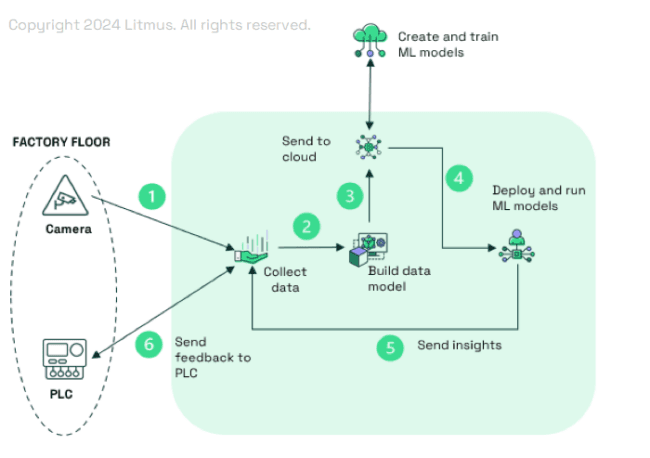Dave McMorran
Director of Sales Engineering
A large manufacturing company created an automated work order based on live monitoring of asset conditions, powered by Litmus Edge – in just a single day.
A leading automotive Tier-1 supplier not only improved overall quality control, but also operationalized ML, significantly improving quality inspection speed and accuracy. All of these while freeing up IT for enterprise-wide business-critical initiatives.

A leading automotive Tier-1 supplier not only improved overall quality control, but also operationalized ML, significantly improving quality inspection speed and accuracy. All of these while freeing up valuable IT resources for other enterprise-wide business-critical initiatives.
The manufacturer faced a bottleneck in their quality control process. Their traditional method for inspection of critical components relied on manual vision analysis. This process was slow, prone to human error, and lacked the scalability needed in a post-pandemic era of manufacturing with severe shortage of skilled labor.
They adopted machine learning to automate their inspection process and integrate data from multiple inspection stations on the assembly line. However, their existing system relied on custom scripts and point-to-point integrations. Maintaining the custom scripts was a constant struggle. Debugging errors and integrating data from additional stations required significant coding expertise. This hindered their ability to efficiently operationalize their ML initiatives. Each new inspection station meant more scripts, more maintenance, and a growing data management headache.
The manufacturing company used the following Litmus Edge features to build their solution:
Device Hub
Digital Twins
Cloud Integration
Application Marketplace for MLOps

The automotive manufacturer used Litmus Edge’ Device Hub feature to collect and normalize their plant floor data – including feeds from the UV cameras and PLCs.
Inside Litmus Edge, they used the Digital Twins feature to add context to their data and build data models based on the collected camera feed.
Then they used Litmus Edge prebuilt connectors to send these data models to their Cloud, where their data science team built and trained advanced machine learning models.
Once the models were ready, they used the bidirectional connectors to bring the model inside Litmus Edge. They deployed the model as a container in the Applications Marketplace.
Next, they operationalized the ML model to run on the collected camera feed data enabling automated quality checks and insights gained are sent to the Device Hub inside Litmus Edge.
Device Hub has native industrial connectors to PLCs. Based on the output of the model, the PLC can accept or reject the automotive part being analyzed for quality check.
The results were impressive. Within two weeks, they had a fully automated UV inspection system in place, significantly increasing inspection speed and accuracy. This not only improved their overall quality control but also freed up valuable IT resources for other mission-critical initiatives.
Effortless scalability.
Litmus Edge eliminated the need for custom scripts, allowing the automotive supplier to seamlessly scale their UV inspection system as their production volume increased.
Reduced maintenance.
This solution reduced IT overhead spent in debugging and maintaining custom code – allowing IT to focus on their core job.
Real-time decision making.
Automated data analysis and MLOps enabled them to identify and address potential defects in real-time, preventing production delays.
Talk to our experts to find out how Litmus Edge can transform OT data into your most valuable asset.
Suranjeeta Choudhury
Director of Product Marketing
Suranjeeta heads Product Marketing and Industry Relations at Litmus.
Dave McMorran
Director of Sales Engineering
A large manufacturing company created an automated work order based on live monitoring of asset conditions, powered by Litmus Edge – in just a single day.
Parth Desai
Founding Engineer & Director of Solutions & Industrials
This article will cover the key benefits and practical applications of integrating Litmus Edge with the AVEVA PI System, enhancing your ability to manage, analyze, and act on industrial data effectively.
Parth Desai
Founding Engineer & Director of Solutions & Industrials
Here at Litmus, there is a common theme in the feedback we receive from our customers. How can I make sense of my raw industrial data, with all its inconsistencies and variabilities, even among identical machines on the same production line?